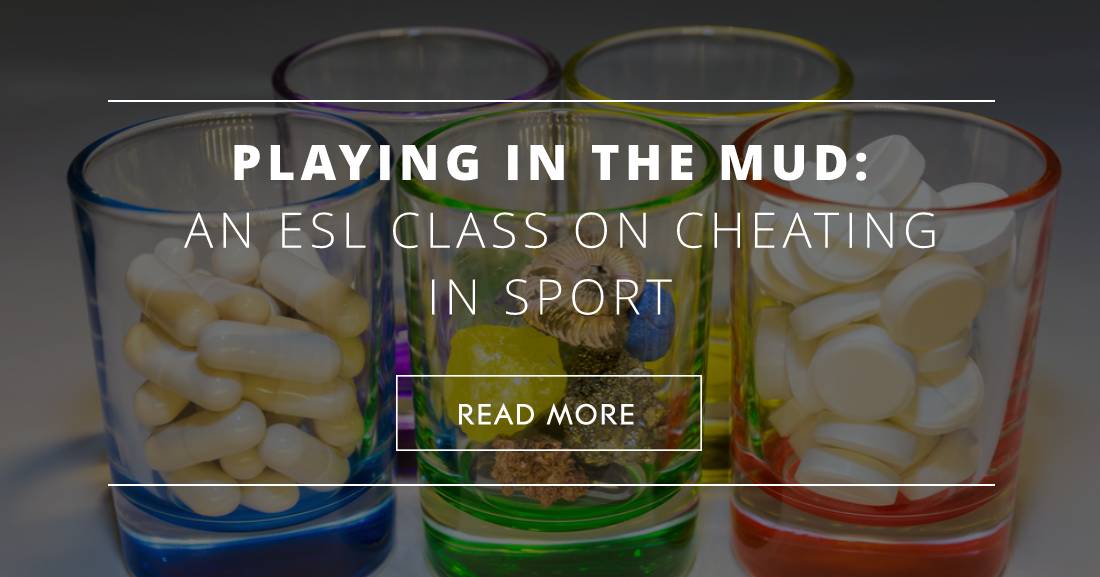
How often do you put your pedagogical beliefs to the test?
A few weeks ago, I found myself dragged into an online discussion related to an article which claimed that a teacher’s responsibility is to ‘transmit knowledge’ and ‘deliver content’. I don’t know about you, but these two expressions make my hair stand on end. I’ve always been wary of ‘lecture-style’ teaching, and reject the article’s central premise: that inviting students to contribute to the content of the class is a recipe for distraction and failure, because the teacher is the only one with the knowledge.
It is my privilege to daily discover just how much my students know, and their depth and range of experience always surprises me. With the provocative article’s doomsday warnings still ringing in my ears, I set out to prove that we can rely on our students to produce language, contribute ideas, and have their own opinions on almost any topic, and all without being lectured to.
After some thought, I decided to try a class on the recent doping scandals in international sport. I felt this would provide ample opportunity for the students to add their own experiences and views, perhaps to the extent that I needed only to ask questions. It was the ultimate litmus test of my decades-old theory that teachers should do a lot more asking than telling, because much of the information is already in the students’ minds, even though it’s encoded in their first language. The details can then simply be extracted by asking the right kind of question.
So, here’s what I found. I’ve bundled together my discoveries with a fleshed-out lesson plan for a two-hour discussion on doping in sport, in the hopes that your students excel as impressively as mine.
4 Stages for an ESL Class on Cheating in Sport
-
1
Starting Point: Elicit Everything
When beginning a new topic, I suppose we face a choice between two schools of thought: 1) The students need to be fed this new information, because they don’t know it yet; or, 2) The students probably know a good portion of the information and could contribute it in lieu of the teacher’s presentation.
I take the latter view almost all the time, unless the topic is exceptionally complex (the Supreme Court, constitutional amendments, states rights, etc). I take this view because my students regularly prove that I can radically cut down on Teacher Talking Time (TTT) by shutting up and instead asking them what’s going on. Here’s how it worked in the class on sports:
Teacher: [Shows clip of the opening ceremony of the Rio 2016 Olympics] What a spectacular show! What’s going on here? Student 1: Brazil! Student 2: Olympic games Student 3: Ceremony… starting ceremony? Teacher: Opening ceremony. Like opening a new business or a museum. Student 2: Was beautiful. So many fireworks. Student 3: I liked the dancing. Teacher: Me too! Let’s try a little ‘word association’, OK? If I say ‘Olympics’ to you, what’s the first word you think of? [Gestures to each student in turn] Student 4: Running! Student 1: Competition. Many nations. Student 2: Achievement? Teacher: Good start… anything else? Student 5: Cheating? Teacher: Ooh, that’s interesting. Why did you say that? Student 5: Because… well, maybe it’s true but I don’t know. Student 4: The news said it was Russia. Teacher: Really? What did the news say? This is only one piece of evidence, but it’s a pretty strong one! All I had to do was show a clip and ask a couple of questions, and the central point of the discussion was immediately revealed without my even referring to it. The students knew what I wanted to talk about, and quickly zeroed in. I didn’t need to give them a ten-minute lecture on the history of doping in sport; they knew the basics already.
-
2
Vocabulary
So, we established our topic context - the Olympic games and cheating - and those ideas were rolling around in the students’ minds. However, the vocabulary for this topic isn’t easy, and I felt the need to confirm, review or teach a few words which I knew would help propel the discussion. Again, I asked rather than telling; the words don’t go on the board until I’ve heard them spoken, as though the students have discovered something independently, and I’m just confirming it:
Teacher: So, if I cheat at a sport, how can you call this behavior? Students: Bad! / Corrupt! / Terrible! / Cheating! / Stupid! Teacher: Corrupt, yes… It’s an example of corruption, isn’t it? Let me have one more example of corrupt behavior? Student 3: Banks who steal. Student 2: Many politicians are corrupt. Teacher: I’m not going to argue with that! Students: [Laughter] Teacher: So, if I’m corrupt, and I cheat, how will people feel about me? Student 2: No trust! Teacher: Yes! Who knows just one word for that? Student 4: Untrust-able? Teacher: Very good try! Anyone else? He’s close… Student 2: Untrustworthy? Teacher: [Big thumbs up]. Perfect! Now, how do people feel about the Olympics, if they suspect the athletes are cheating? Student 1: Is not the same as before. Is like… Student 3: No one will watch it. Student 4: It had… like… a bad smell? In French, we have this expression. Teacher: Or a bad color, maybe? Try this word with me… Tarnished Students: [Pronunciation drill] Tarnished. Teacher: The reputation of the Olympics became tarnished. Its colors aren’t as perfect as before. Student 4: Like… it’s no good, any more? No one trusts it? Teacher: Exactly. What else has a tarnished reputation, these days? All the way through this vocabulary presentation, my hands were moving and my face was alive, hoping to clearly communicate the words and to elicit more. It’s also true that my students know me very well, and are aware that ‘presentation’ is done as much by them as by me.
We ended up working through a range of vocabulary, both during that initial presentation and in the discussions which followed. Ultimately, we learned or confirmed:
Contempt(able) Heinous Underhanded Foul Corrupt Beyond the pail Unacceptable Undermine Corrode Impartiality Violation Sanctions Ban Fine Exclusion
Because these words came up very often in the discussions, there was very effective free practice in the right context. I also quickly brainstormed all the Olympic sports we could think of; to check some off these sports, and add others, I asked the students to judge whether or not a given sport was part of the Olympics (e.g. ‘rowing’ is, but ‘chess’ is not).
-
3
Initial Discussions
Right after presentation, I like to get into ‘controlled practice’, a section of the class where I make it as likely as possible that the students will begin using the target language. Yet again, I believe in a more ‘hands-off’ approach, mainly because language production which is done spontaneously seems so much more natural and enjoyable than the alternative: a teacher prodding the students to say a word, like a parent with a toddler.
So, I set three pair-work questions for the students to discuss:
- If an athlete cheats, what should happen to them?
- Do you agree with the IOC decision to ban Russia from the Olympics?
- Why do you think athletes take the risk of using banned substances?
These questions yielded a great deal. There were varying opinions on all three, and our target vocabulary immediately began to emerge; in fact, it had to, because there’s no way of discussing this contentious (and very engaging) topic without it. On those occasions a student could have used one of our target words, I steer them toward it:
Student 4: But if the athlete cheats, they should never play again. Teacher: Wow, you think they should be banned for life? Student 2: Is too much! Teacher: Then, what ban would be appropriate? Or maybe only a fine? Student 3: Fines don’t do anything. Must be a ban. Without my having to re-teach anything, my class willingly confirmed that they know how to use at least two of our target words. I judge that this ‘knowing’ has truly happened when:
The student can use the word freely, accurately and spontaneously to express what they mean.
-
4
Going Further
The sky is the limit. Once my students grasped, and began to use, the target language, any area of discussion was open to us. I chose to focus on sanctions and incentives, but any of these topic areas are fertile ground for discussions and writing practice:
- Can sport ever be truly clean?
- What will it take for the public to begin trusting sports people again?
- Is there the need for tougher sanctions?
- Should every athlete be tested after every competition?
- Should drug testing be extended to the Paralympics?
- Is a certain amount of cheating or substance use inevitable?
- Is a lifetime ban ever appropriate?
- Does it feel unfair to punish the entire Russian athletics team for the actions of their superiors?
- When should Russia be re-admitted? What progress should be demonstrated?
I set research assignment for homework, focusing on the situation with Russia, and the South African athlete Caster Semenya, who has faced (often deeply unfair and insensitive) scrutiny over her gender and testosterone levels.
I’d agree that one successful class isn’t emblematic of anything in particular, but I’ve used this approach thousands of times, when discussing dozens of different topics, and it very rarely fails. Asking rather than telling has taught me to trust my students, and to depend on them being able offer some kind of an answer to almost anything I ask, however complex. I believe that to stand at the front and lecture is to patronize your students, and to reject the richness of experience they already have. Sure, there are times when we’ll have to feed in a lot of information, but consider this: how many topics can you name, about which your students know absolutely nothing?
For me, a new topic like doping in sports is an opportunity to ask, not to tell, and I can’t recommend this approach highly enough.
P.S. If you enjoyed this article, please help spread it by clicking one of those sharing buttons below. And if you are interested in more, you should follow our Facebook page where we share more about creative, non-boring ways to teach English.








